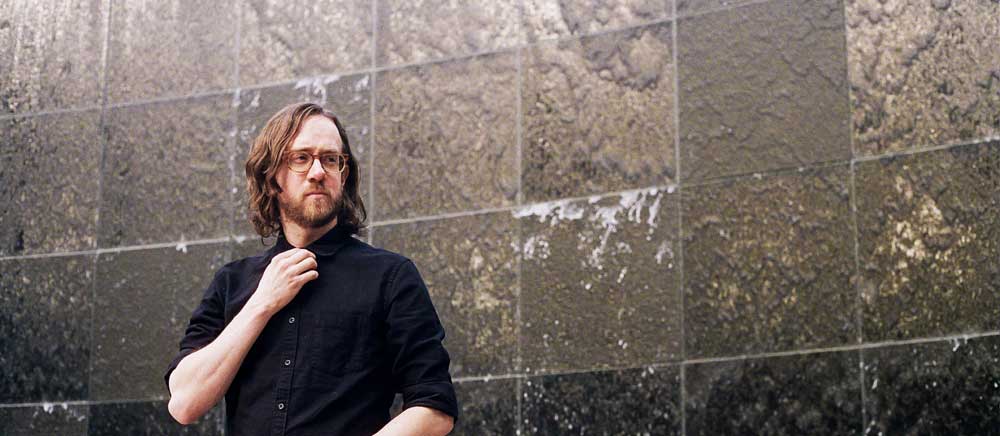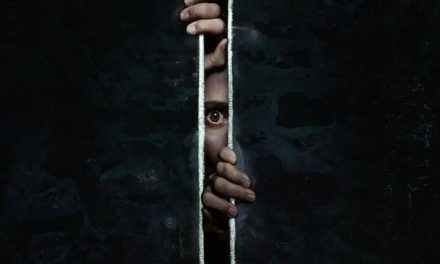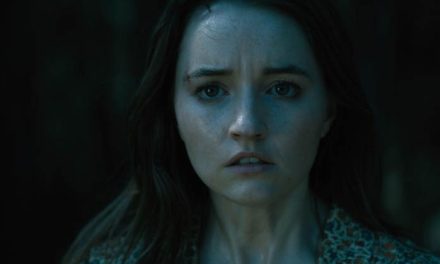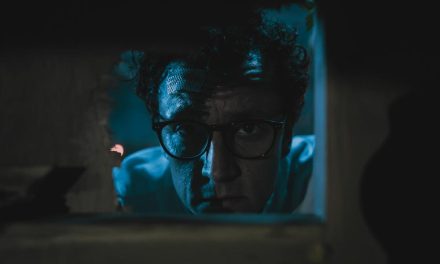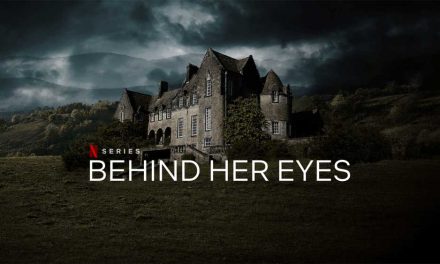Heaven of Horror recently spoke with composer Casey J. Cooper (CoastalDives) about his score to Shudder’s new film, Night’s End. Read the full interview below.
Night’s End Synopsis: An anxious shut-in moves into a haunted apartment, hiring a stranger to perform an exorcism which quickly takes a horrific turn.
The film stars Geno Walker, Kate Arington, Michael Shannon, Isaac Dees, Felonious Munk, Daniel Kyri, and Theo Germaine.
What attracted you to Night’s End script?
I immediately connected with the solitude of the lead character, Ken. Although it was self-imposed and mostly out of paranoia, his isolation resonated with me because everyone had just lived through a year of covid. That’s very relatable as more and more interaction seems to be through phones or computers. I knew that a lot of the film would take place with Ken alone in his apartment, and thought that would be a good pairing with my compositional style; slowly moving, subtly evolving chords, textures, and colors.
How soon into reading a script does your musical mind get to work?
When I’m reading a script for the first time, I try not to think about the music. It’s only after I’m finished and have some time to let the story settle in my mind that I’ll start thinking about mood or theme. Then I’ll jot some notes down of very generalized musical ideas, and slowly start composing.
It’s good for me to verbalize what I’m aiming for before I dive into the score. Otherwise, I might lose track of what I originally intended to do (which isn’t always bad, I suppose). I think it’s good to trust your first instincts and to make sure you document that before starting the compositional process.
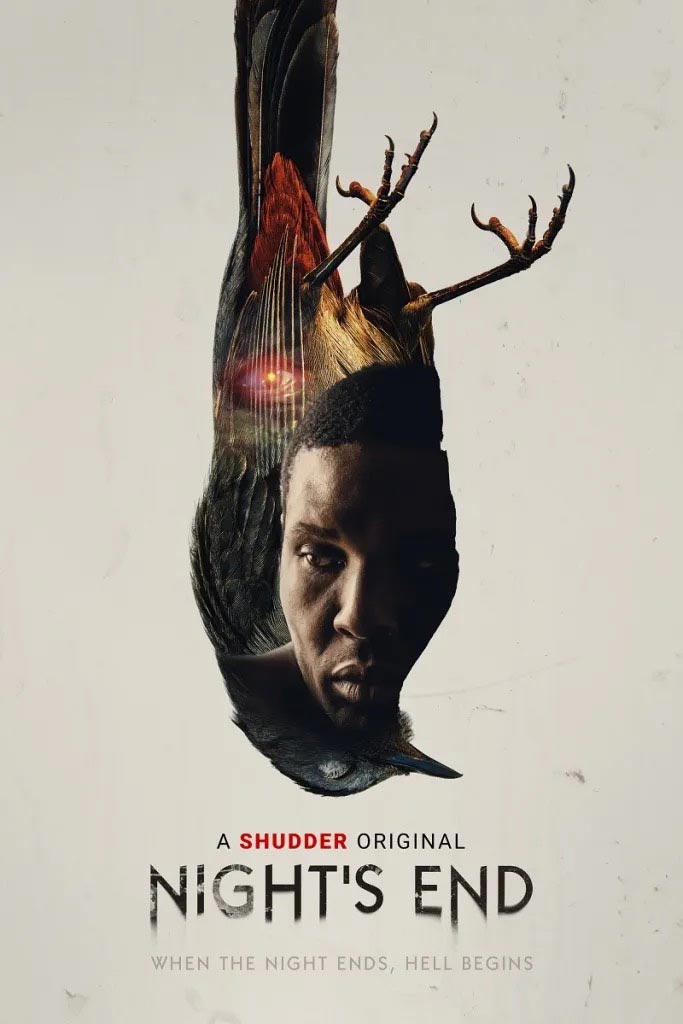
What were the initial discussions about the film’s score like?
I started talking with the director, Jennifer Reeder, a couple of days after reading the script. I knew at that point I wanted to compose something synth-heavy, but with orchestral elements in order to have a hybrid sound. I communicate my themes best with synthesizer but also thought that augmenting the themes with strings and other orchestral instruments would open the door for more conventional dissonance and discomfort, both of which are obviously important to the vibe of a horror film.
Reeder is very familiar with my style, and she essentially told me to just go for it. So I composed some generic themes (before I had any of the film) and sent them to her. She liked the direction I was taking it, which gave me confidence to carry on with these ideas and my intuition.
Did you watch any other horror films to get inspiration for your Night’s End score?
I chose not to watch any horror movies during the majority of scoring this film. Not because I wouldn’t benefit greatly from them, but because I didn’t want to sound derivative. It was important for me to put a unique musical stamp on this film. Of course, I have my influences lingering in my head while I write. That’s unavoidable and I’m glad they’re up there. But I wanted to compose in my own style and see how far I could take the dissonance without hitting anyone over the head with it.
The eerie vibe is there throughout the entire score, but often it’s subtle. Some scenes call for a lot more of it, and those were a lot of fun. But it doesn’t all have to be that scary all the time, otherwise, it loses its effect. I wanted some music that might be nice to listen to if Ken (the lead character) weren’t alone, dealing with a haunting, and seemingly losing his mind. Toward the end of the film, I did listen to Disasterpeace’s “It Follows” and Colin Stetson’s “Hereditary”. Those are both amazing scores and I was able to pull some inspiration from both.
What story elements of Night’s End most informed the music?
I think the discomfort from isolation was the motivating theme throughout the film. Things just seem to go from bad to worse, and the musical tone reflects that. But so much of the film’s mood was shaped by Reeder’s slow pacing and the beautiful cinematography of Christopher Rejano. And that guided a lot of my music. There’s a sadness throughout, both in Ken’s character and in the vibe of the film itself. And I gravitate toward a melancholic style. Those worked really well together.
Did you give any of the characters their own themes? If so, can you talk about those?
Ken has a morning routine that shows several times over. It gets more intense as the film progresses. I made sure to have a specific theme for this and to degrade the harmony of that theme a little more each time we see it play out. There is a repetitive, slightly dissonant arpeggiation over a simple and otherwise nice chord progression. But as the routine starts to degrade in the film, so does the harmony in the theme. The notes rub a little more uncomfortably each time. It was an obvious choice that emphasized Ken’s worsening state of mind.
Most of the film takes place in Ken’s apartment. How much of the setting influenced your work?
We see the same rooms and similar visuals in the apartment throughout the film, so the slight variations on some of the repeated musical themes are more noticeable. I composed a handful of melodic and harmonic ideas that keep coming back but altered in a new way each time. These provided a common thread that gave the score a cohesiveness and tied a lot of the scenes together.
Is there a specific time when you knew you wanted to compose for films?
Reeder approached me years ago about scoring one of her early short films after watching my band play a show. I hadn’t thought much about it before that, but I was game to try. It was a good fit because I liked her style and she liked my music, and the two seemed to work really well together. Since then, I’ve continued to compose for Reeder on a number of short films, as well as for other directors and artists. The more I compose for film, the more I love doing it.
Have there been any horror film scores in the past year that have stuck out to you?
“The Night House” score by Ben Lovett really resonated with me. The story is highly disturbing as it unfolds, but Lovett’s score turns a lot of it into a sad, relatable tragedy. There are a lot of pretty moments until there aren’t. The music gets very atonal and harsh. It’s the kind of score that fits perfectly with the film and conjures up all kinds of horrific, dark thoughts by itself.
- The Platform 2 Ending Explained - October 4, 2024
- Horror on Netflix in October 2024 - September 24, 2024
- Best Horror Movies on Tubi - September 18, 2024

